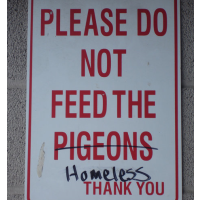U.S. Cities Passing More Laws to Make Homelessness a Crime
 (photo: National Coalition for the Homeless)
(photo: National Coalition for the Homeless)
By Cathy Bussewitz and Colleen Slevin, Associated Press
HONOLULU (AP) — Cities across the country are enacting more bans on living in vehicles, camping in public and panhandling, despite federal efforts to discourage such laws amid a shortage of affordable housing, a new report said.
Denver, which ordered about 150 homeless people living on sidewalks to clear out their belongings Tuesday, was among four cities criticized for policies criminalizing homelessness in a report by the National Law Center on Homelessness and Poverty, an advocacy group aiming to prevent people from losing their homes.
The other cities listed in its "hall of shame" are in Hawaii, Texas and Washington state.
People in Denver chanted, "No handcuffs. Give us homes," as they packed up their belongings when police arrived. As they piled shopping carts high, a jumble of items cluttered the area: a banana, a paperback copy of Shakespeare and a pair of construction boots.
Many cities with increasing home prices have been struggling with homelessness, including Denver and Honolulu, which were reprimanded for an anti-camping law and ban on sitting or lying on sidewalks, respectfully.
"These laws are unconstitutional and bad public policy," Maria Foscarinis, the center's executive director, said in a phone call with reporters. "Homelessness remains a national crisis across the country. It's fueled by the growing lack of affordable housing and the shrinking safety net."
The report, which was based on a review of policies enacted by 187 cities over a decade, said bans on living in vehicles increased by 143 percent. Those laws can be particularly devastating because they often lead to vehicle impoundment, and people can lose all of their belongings, disrupting their ability to work or attend school, Foscarinis said.
In Denver, authorities had given notice that homeless people had to move their things. While some packed up and left, others resisted, so the city gave them more time, said Julie Smith, a spokeswoman for the human services department. She said the city wants to help them go to shelters and get other services.
Bennie Henley, an Army veteran who moved to Denver two weeks ago from Kansas to get treatment at the Veterans Administration hospital, said he prefers sleeping on an advertising banner rolled out on the sidewalk rather than in a shelter. He showed a rash on his arm that he thinks came from bedbugs in a shelter.
"I don't like being crowded up like that," said Henley, sitting on a swivel office chair on the sidewalk and leaning on a cane.
The report said Denver forces thousands of people to dismantle camps despite a waiting list for subsidized housing.
City spokeswoman Amber Miller called the report's findings inaccurate, saying the center relied on local advocacy groups with incorrect information. She said Denver's priority is helping people find assistance.
"We have increased outreach workers and paired them with police patrols, expanded day and night shelter, created 250 units of permanent supportive housing and launched a day work program," Miller said in a statement.
Honolulu was criticized for what the report called aggressive enforcement of its sit-lie ban. The group said the city has issued more than 16,000 warnings to people violating the ban since it was enacted in Waikiki in 2014.
But Honolulu Mayor Kirk Caldwell's spokesman Jesse Broder Van Dyke said the report fails to mention that since the sit-lie law took effect in September of 2014, officers have issued 21,630 warnings and made only 27 arrests after a public education and warning period.
He also said over the last two years Honolulu has helped house more than 1,000 people who were experiencing homelessness, including over 860 veterans.
The report also targeted Dallas and Puyallup, Washington. Dallas was criticized for issuing thousands of citations for sleeping in public, and Puyallup, for making it illegal to camp, panhandle or sit and lie down in parts of the city, despite lacking adequate space in an emergency shelter.
Officials from those two cities didn't immediately respond to requests for comment.
The report called several such policies unconstitutional. The group said panhandling is protected by free-speech rights and preventing sleeping in public could be considered cruel and unusual punishment.
To Learn More:
Housing Not Handcuffs: Ending the Criminalization of Homelessness in U.S. Cities (National Law Center on Homelessness & Poverty)
Homeless Sue Cities for Making Homelessness a Crime (by Noel Brinkerhoff and Steve Straehley, AllGov)
HUD Threatens to Withhold Aid Money to Cities that Criminalize Homelessness (by Noel Brinkerhoff and Danny Biederman, AllGov)
58 California Cities Have Anti-Homeless Laws (by Ken Broder, AllGov)
Manteca Joins Lengthening List of Cities Trying to Banish the Homeless (by Ken Broder, AllGov California)
- Top Stories
- Unusual News
- Where is the Money Going?
- Controversies
- U.S. and the World
- Appointments and Resignations
- Latest News
- Trump Orders ICE and Border Patrol to Kill More Protestors
- Trump Renames National Football League National Trump League
- Trump to Stop Deportations If…
- Trump Denounces World Series
- What If China Invaded the United States?






Comments